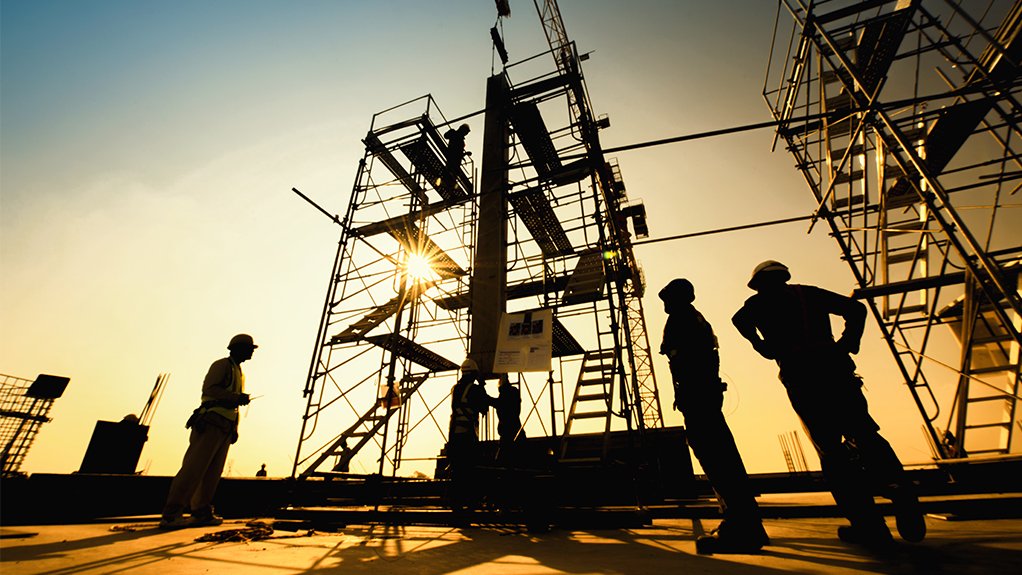Private spend still lags in major public infrastructure projects
Only 2% of Infrastructure South Africa’s (ISA’s) pipeline of projects will be delivered as part of public-private partnerships (PPPs), an issue the ISA says is being addressed by reforms to improve investor confidence in megaprojects.
ISA infrastructure investment planning and oversight deputy director-general Mameetse Masemola says gross fixed capital formation (GFCF) is currently well below levels envisaged in the National Development Plan (NDP) 2030 and that there is insufficient participation of the private sector in the planning, funding and implementation of major public infrastructure investment projects and programmes.
There is also inadequate central coordination to drive the public infrastructure investment mandate, Masemola states.
GFCF currently comprises 14.1% of GDP, against the NDP’s target of 30% by 2030.
The National Budget projected that public sector infrastructure expenditure would be allocated more than R1-trillion over the medium-term expenditure framework, including R402-billion for transport and logistics, R219-billion for energy infrastructure and R156-billion for water and sanitation infrastructure.
However, this still leaves a R1.6-trillion investment gap by 2030, if the NDP is to realise.
The country’s sources of spending on large public infrastructure projects comprise 4% national departments, 2% PPPs, 23% local governments, 19% provincial governments an 52% State-owned enterprises and public entities.
Masemola says the ISA is focused on advancing more PPPs and blended finance projects, as well as transferring fiscal risk from government and advancing projects with high GDP impact.
Some projects that are in the pipeline – approved by the Infrastructure Investment Committee but not yet by the Budget Facility for Infrastructure – include four transportation projects and two water and sanitation projects worth R42-billion, which government will take to market in the next 12 to 18 months.
These projects are based in Limpopo, KwaZulu-Natal and the Eastern Cape, with one project focusing on coal rail export line infrastructure across multiple provinces.
Masemola says South Africa offers “unmatched” opportunities in infrastructure investment, including through the Just Energy Transition-Investment Plan, which alone targets R1.5-trillion in climate-aligned investments.
She affirms that a solid pipeline of projects being prepared and packaged by the ISA is focused on garnering increased private-sector participation, both in financing and delivery.
The challenges impeding private-sector investment, however, remain financial and technical engineering capacity within government, the lack of centralised planning and project development and insufficient project development funding allocations, particularly for municipal bulk infrastructure.
Masemola says delays in municipal bulk infrastructure projects is often the single-biggest factor holding back other projects.
She points out that another challenge is that of spatial disparities and investment being largely focused in the metro areas of the country.
The opportunities, on the other hand, are being realised by the structural and regulatory reforms under way through Operation Vulindlela, government being dedicated to building capable institutions and being increasingly open to partnerships with the private sector.
Masemola says the ISA alone has managed to maintain a 90% success rate in streamlining approvals for projects worth more than R1-billion to within 30 days, for compliant applications.
The ISA has also developed a method of work with various departments and entities, which helps to accelerate project approvals.
Prescient Investment Management CEO Cheree Dyers highlights the importance of infrastructure in South Africa’s future, including to build more renewable-energy projects, upgrading logistics corridors and advancing social housing developments.
She agrees that the significant challenges to public infrastructure projects are funding gaps, aging bulk infrastructure, congested ports, pressured rail systems, underfunded water infrastructure and delayed approvals.
Dyers emphasises the need for alignment, urgency and delivery in infrastructure development, citing Germany as an example of fast movers in infrastructure development approvals.
Dyers believes financial institutions and institutional investors should help shape the infrastructure ecosystem by engaging with project developers sooner to help de-risk and structure projects to make them bankable and developmentally meaningful.
She adds that stakeholders should also demand more accountability from government to ensure infrastructure projects lead to desired outcomes.
REGULATORY CHANGES
Some of the reforms that aim to support infrastructure investment include that of the Division of Revenue Act to allow provinces to borrow against future budget allocations, which should enable provinces to better plan and invest in public infrastructure projects.
Government is also reviewing Regulation 28 of the South African Pension Funds Act, to allow for more retirement savings to be invested in infrastructure asset classes.
Streamlined approvals are the main focus of PPP regulations that are in the works, while government will publish, in August, regulations for public comment relating to infrastructure, which were developed by the ISA and the National Treasury.
Masemola delivered a keynote address during Prescient Investment Management’s Infrastructure Conference, on July 24.
Article Enquiry
Email Article
Save Article
Feedback
To advertise email advertising@creamermedia.co.za or click here
Announcements
What's On
Subscribe to improve your user experience...
Option 1 (equivalent of R125 a month):
Receive a weekly copy of Creamer Media's Engineering News & Mining Weekly magazine
(print copy for those in South Africa and e-magazine for those outside of South Africa)
Receive daily email newsletters
Access to full search results
Access archive of magazine back copies
Access to Projects in Progress
Access to ONE Research Report of your choice in PDF format
Option 2 (equivalent of R375 a month):
All benefits from Option 1
PLUS
Access to Creamer Media's Research Channel Africa for ALL Research Reports, in PDF format, on various industrial and mining sectors
including Electricity; Water; Energy Transition; Hydrogen; Roads, Rail and Ports; Coal; Gold; Platinum; Battery Metals; etc.
Already a subscriber?
Forgotten your password?
Receive weekly copy of Creamer Media's Engineering News & Mining Weekly magazine (print copy for those in South Africa and e-magazine for those outside of South Africa)
➕
Recieve daily email newsletters
➕
Access to full search results
➕
Access archive of magazine back copies
➕
Access to Projects in Progress
➕
Access to ONE Research Report of your choice in PDF format
RESEARCH CHANNEL AFRICA
R4500 (equivalent of R375 a month)
SUBSCRIBEAll benefits from Option 1
➕
Access to Creamer Media's Research Channel Africa for ALL Research Reports on various industrial and mining sectors, in PDF format, including on:
Electricity
➕
Water
➕
Energy Transition
➕
Hydrogen
➕
Roads, Rail and Ports
➕
Coal
➕
Gold
➕
Platinum
➕
Battery Metals
➕
etc.
Receive all benefits from Option 1 or Option 2 delivered to numerous people at your company
➕
Multiple User names and Passwords for simultaneous log-ins
➕
Intranet integration access to all in your organisation




















